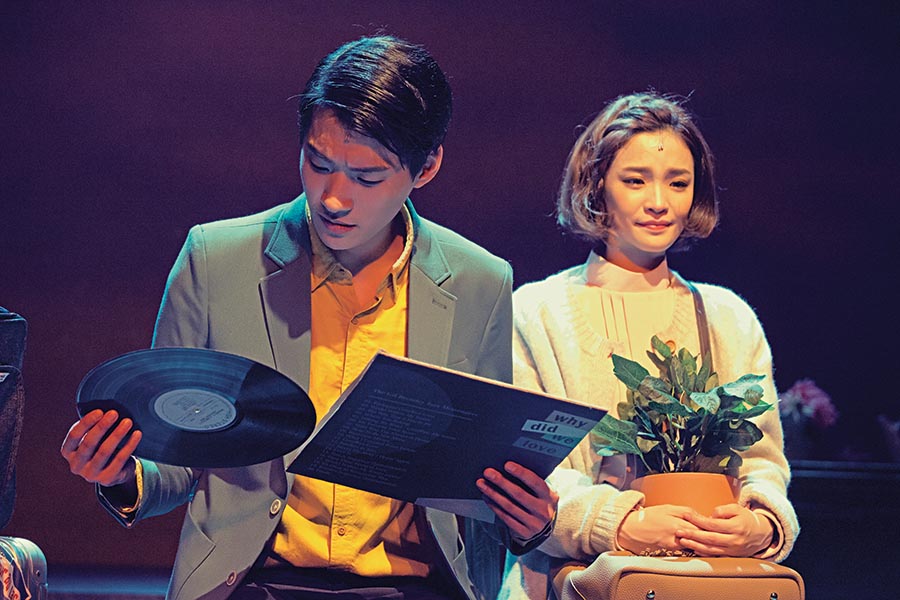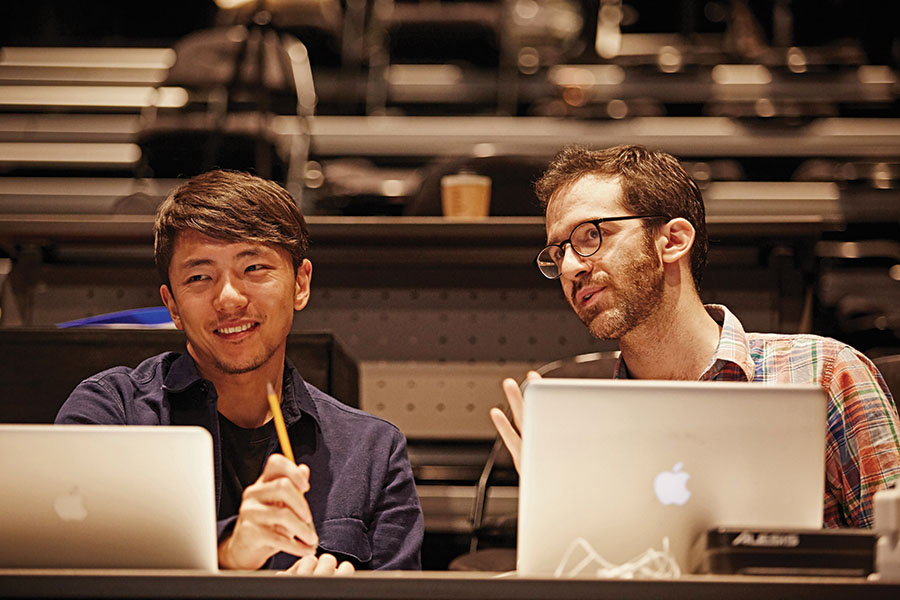Musical theatre has been called a uniquely American art form, but that’s no longer the case (if it ever was). That’s at least in part because musicals from the U.S. have toured the world, and some of the countries they’ve visited have begun developing musicals of their own. South Korea, in particular, has developed an entire industry of new work.
Now Americans will get a chance to sample the results, as the first musical from South Korea to receive a major U.S. regional production, Maybe Happy Ending, comes to the Alliance Theatre in Atlanta, Jan. 21-Feb. 16. Not that there’s a hard line between the show’s American and Korean roots: It is the creation of an American, Will Aronson, who wrote the music, and a Korean, Hue Park, who wrote the lyrics; the pair co-wrote the show’s book. Neither collaborator is a newcomer to the other’s culture: Aronson wrote music for My Scary Girl, presented at 2009’s New York Musical Theatre Festival as part of a partnership with Korea’s Daegu International Musical Festival, and Park studied visual art in New York City, which is where the two met.
The inspiration for the show was also a blend of Western and Korean influences. Park was in a coffee shop in Brooklyn when the song “Everyday Robots” by Damon Albarn started playing. Albarn’s former band, Blur, had been popular in Korea when Park was growing up in the 1990s, and the lyrics caught his attention: “We are everyday robots on our phones in the process of getting home.”
“In the moment, I thought, it’s true, we’re turning into robots, attached to our smartphones, feeling more comfortable communicating through text messages instead of face to face,” Park said in a phone interview from Atlanta. He took the idea to Aronson. “What if we write an intimate show about love and relationships,” he proposed, “but the protagonists are actually robots?”
Park had recently ended a long-term relationship himself, which led him to think about the closing of a chapter. Aronson was intrigued and latched onto that idea as well. “The world feels like it’s ending,” Aronson said on the same phone call with Park, referring to the global crises we seem to be facing. “Imagine, in the wreckage of that, robots go on from that beginning. Maybe that’s the happy ending—maybe we left a few crumbs for the next generation. Maybe it will be a happy ending for mankind through them.”
Though he studied visual art in the United States, Park majored in writing and wrote lyrics for Korean pop music, known internationally as K-pop. Breakup songs happened to be his forte. He’d met Aronson through mutual friends, and the two bonded over a shared love of artists Miranda July, Ryuichi Sakamoto, Sophie Calle, and Bernard Herrmann. Park and Aronson wrote some pop songs together, just for fun. A few years later, a Korean musical theatre producer commissioned them to write a musical together. The result was Bungee Jump, which opened on July 14, 2012, in Seoul. An adaptation of a South Korean film, it won Best Score at both the Korea Musical Awards and the Musical Awards, two of Korea’s major honors. After that success, Park pitched his idea for Maybe Happy Ending to a producer at the Wooran Foundation, a nonprofit in Seoul that supports young artists. The producer was sold.
They got the commission in 2014, did a reading the next year, then a three-night tryout production. Commercial producers joined, and in the winter of 2016 another production ran for several months. The writers never dreamed it would get a major U.S. staging. They figured it might end up in a small black box, even someone’s backyard.
As it turns out, Atlanta theatregoers will get the first opportunity to see Maybe Happy Ending in the States. Allan Williams of Foresight Theatrical, a general management company, brought the piece to Alliance Theatre artistic director Susan V. Booth. At first, Booth admitted, she avoided the “Korean robot musical.” But she’d partnered with Williams on shows before and trusted him. It only took about 20 pages and the song “My Room” for the show to win her heart.
“I love work that I can’t compare to anything else,” Booth said in a phone interview. “It is this reverie about the moments and the step-by-step minutiae that make up our lives that we all too infrequently stop to hold dear. I mean, Thornton Wilder scratched that itch in Our Town, but it’s been a minute since I’ve encountered a new work of musical theatre that did it with such grace.”
Director Michael Arden, Tony-nominated for Deaf West’s Spring Awakening and the Once on This Island revival, joined the team through producer Jeffrey Richards. Like Booth, Arden needed some convincing, but he fell in love once he read the script and listened to the score. “It’s ultimately a story about humanity and how love enters into our world, and that when you sign up to love someone you sign up to lose them,” he said in a phone interview.
The adventurous piece uses about 25 locations, set in the future, and focuses mainly on two characters (there are four actors in total). Booth thinks the Alliance’s audiences are up for the challenge. “To make a crowd of people who are literally from all over the map lean in together, a piece has to have an emotional DNA that this piece has,” Booth says. “Ironically, considering the central characters are robots, it is one of the most essential plays about being human.”

An essential part of being human is language. For the first draft of Maybe Happy Ending, the authors wrote the book in English, while Park wrote the lyrics in Korean. The English lyrics in the show now are not a direct translation. “All the lyrics began their life as Korean lyrics, and then together we figured out whether the English lyrics could be similar to the Korean lyrics or if we had to go farther afield,” Park explained.
The main difference between American and Korean lyrics? Rhyme. While it is a major component of English-language lyric writing—as a structural organizing principle, as a way to point up words and phrases, or as a way to show character and intelligence—Korean lyric writers mostly avoid rhyme.
Instead, Korean lyrics focus on vowel sounds, similar to American opera writing. “A lot of rhymes in Korean are silly and funny, and it is hard to rhyme in Korean and convey an emotional quality,” Park explains. Korean lyricists look for words to further the narrative or express emotion. “It’s about making the right choices for each sentence for each song,” he continues. “Does this word sound best for this moment in the song, or should I compose a totally different sentence?”
But Aronson and Park insist that cultural differences are not really on their minds. For Aronson, the music isn’t Korean or American. It’s written for a certain emotional mood—“acoustic and unironic, emotional, but also trying to capture something about the current moment,” as he describes it. The instrumentation includes strings and winds. And, as one of the robots is a big fan of jazz, Aronson also used Duke Ellington and Bill Evans as inspirations.

South Korea’s musical theatre culture is still young. Since The Phantom of the Opera arrived there in December 2001, Koreans have been creating original musicals in their language and culture. “There’s a strong notion, even among the audience, that musical theatre is a Western art form,” Park said. “So we are still learning, but also energetic about trying our own way. Not that many people still know the full potential of musical theatre in Korea. I know those [U.S.] musicals can sometimes be very exciting and exotic, but the real power of theatre and drama comes from watching something resonant for the audience.”
Arden pointed to what he thinks may be musical theatre’s constant. “There’s an American optimism at play in most musicals, for better or for worse,” he said. “A sense of blind optimism that’s very American—the American dream, anything can happen—that isn’t prevalent all over the world. Koreans really embrace and love musicals, so it’s exciting to see that this open optimism is shared worldwide.”
Aronson points out, however, that even American writers are still figuring out what the musical form is capable of. “How optimistic does a musical need to be?” he wondered. “Writers have mixed feelings about it. We’re still trying to solve those questions. Anything’s on the table now for young writers.”
Another Korean writer, Josh Jung, graduated from New York University’s Graduate Musical Theatre Writing Program in 2012, and now writes in Korea and teaches musical theatre writing and “song acting” at the Seoul Institute of the Arts. Jung said in an email that since musicals arrived in the early 2000s, Koreans built more theatres and programmed more musicals in the existing ones. Unlike U.S. commercial theatre, however, Korean musicals don’t do open runs. To have enough productions to keep theatres open (three to six shows a year), producers have brought over popular Broadway shows. Then Korean writers began to come to the U.S. to study musical theatre writing, at programs such as NYU, a two-year MFA program that has taught around 51 Korean students, and the BMI Workshop, which welcomes new students each year.
Jung said that Korean-made musicals really arrived in the late 2000s. “Before then, the industry solely depended on American musicals,” he said. “By the mid-2010s, Korean-written musicals were produced more than American musicals in Korea. But still, Korean musical theatre needs new content every season. Korean musical theatre’s fate doesn’t solely depend on American musicals, but it still largely depends on it.”
Now that Americans are starting to look to Korea, maybe the lines between American and Korean musical theatre will continue to blur, and we can stop referring to musicals as an exclusively American art form.
“It’s a little presumptuous,” said Booth of the U.S. territorial claim over musical theatre. “Our country has just uniquely commercialized it. We do live in a global economy, and that includes a cultural global economy as well. The easiest approach when one is looking for narratives is to stay in one’s defined backyard. The world is big, and it’s nice to be reminded of that.”
Ultimately, Park and Aronson don’t think of Maybe Happy Ending as a Korean musical. “I wrote it with Will in America,” Park explained. “I’d also hesitate to call it an American musical, since the show was intended to premiere in Korea, and the songs were first written in Korean. Nationalism should not get involved in the fact that this will be the first Korean show to have a major regional production [in the U.S.]. I don’t think about it. I’m thrilled that it’s meeting American audiences.”
Shoshana Greenberg is a musical theatre writer, playwright, and theatre journalist living in New York City.
CREATIVE CREDITS FOR PHOTOS: Maybe Happy Ending. Direction: DongYeon Kim; choreography: HeeJin Song; scenic design: KyungSik Nam; lighting design: DongJin Lee; projection design: HyeMin Kim; costume design: DoYeon Kim; sound design: JiHwi Kwon.


